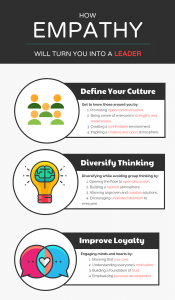
A true leader goes beyond the daily routine and takes a step back thinking about the consequences of every human interaction.
When you share ideas, proposals, or concerns, are you aware of their emotional impact on your team?
If you keep your thoughts to yourself, do you realize that they can take a toll on your own emotional balance?
Leaders want to be heard and valued, want to promote an atmosphere of positivity and productivity. This can be achieved more easily through self-awareness and empathy.
Leaders who are empathetic earn the trust of employees, who in turn are more productive. The right approach to empathy can go a very long way in promoting positivity at work.

What is empathy?
According to Gustavo Razzetti, author of Stretch for Change, there are two kinds of empathy: Emotional and Cognitive.
- Emotional Empathy is activated by mirror neurons, which allow us to feel another person’s feelings in a passive manner.
- Cognitive Empathy is also known as ‘perspective taking,’ when we are aware of your own insights and make an effort to understand others.
In the early 1990s, neuroscientists discovered that we have specific brain cells that become active when someone else is suffering. In essence, we can feel someone’s pain and move toward a closer understanding of them.
Of course, as a leader, it’s imperative that you understand where an employee is coming from on a topic without being triggered into an emotional response or unhelpful decision. Maintaining a clear, yet compassionate approach can be better achieved with Cognitive Empathy.
How can empathy help you be a more effective leader?
A skill that can be worked on and finely tuned with practice, Cognitive Empathy is invaluable for organizations because it:
Builds Team Culture. Making an effort to understand how someone thinks, behaves, and feels can offer you essential insights and allow your co-workers or employees to feel valued.
Diversifies Thinking. Not only does empathy create a feeling of connection among peers, but taking the time to understand someone else’s perspective increases diversity and convergence of ideas, explains Razzetti.
Impacts Communication. In her recent article, Prudy Gourguechon, Psychiatrist and Psychoanalyst, explains that empathy allows you to understand if you have fully reached and connected with those around you.
Inspires Loyalty. With empathy as a regularly used tool in your leadership belt, you can build your team, inspire followers, nurture leadership in others, and elicit loyalty, notes Gourguechon
What if you’re not naturally empathetic?
Empathy is an innate trait that’s in all of us; however, like anything else, it runs on a spectrum of weak to strong.
If you’re not naturally inclined to empathy, you can still harness its power through a few simple tactics:
Think before you act. For instance, if an employee needs time off during a busy peak, before you say ‘no,’ take a moment to consider what your decision will mean to the person.
You don’t need to say ‘yes’ if the answer should be ‘no.’ But showing you understand where the person is coming from goes a long way in keeping up morale.
Practice mindfulness or seek advice. If you’re not strong in the empathy department, you don’t need to change who you are. First of all, being aware of it allows you to fill in the gap with someone who compliments your weakness, notes Gourguechon.
Can you be too empathetic?
Imagine spending your whole day feeling the ups and downs of everyone around you. Sound fun? Not at all.
Being highly empathetic is a superpower in so many ways, but it can also hinder your ability to function as a leader if you’re pulled in too many directions.
Perhaps you’re managing a small team of recruiters who often have disputes with one another. As the team leader, you want to keep your eye on the goals, so that you can make deadlines and expand your recruitment services.
If you spend every afternoon feeling emotionally charged thoughts unrelated to the big picture goals, then your vision and effectiveness as a leader become muddied. Of course, it’s imperative to explore workplace disputes and aim to resolve them, but it’s also your job to keep a compassionate, yet targeted eye on the prize.
With the right amount of awareness and insight, you can feel out another’s perspective and understand the social and emotional landscape of your work environment. Use empathy to create well-informed decisions, to inspire loyalty, and to communicate as clearly as possible.


